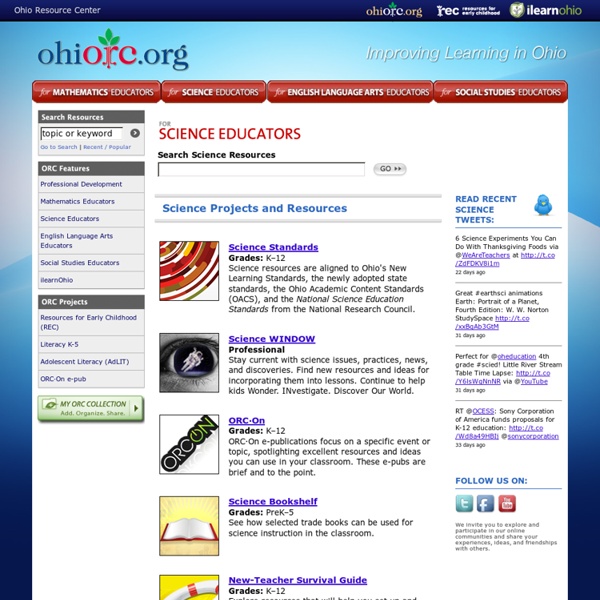



ORC On > 6-8 These resources will help students in grades 6–8 focus on the mechanics of earthquakes and tsunamis and learn about protecting people and property. Living in Earthquake Country (ORC #11514). Investigate how and why earthquakes cause damage by exploring a number of different things including seismic waves, the ability of scientists to predict the likelihood and severity of earthquakes at specific locations, the difference between magnitude and intensity, the occurrence of earthquakes along patches of planar faults, and the potential damage caused by earthquakes such as landslides, liquefaction, and structural failure. Listening to Earthquakes. JASON News Highlights. Tsunami: The Great Waves. Tsunami. Disaster in Japan. The Quake-Catcher Network.
PBL Meets STEM: Delicious Main Course of Resources and Ideas It is great to share my second ISTE 2012 Blog from here in San Diego, CA. The first was on writing Driving Questions. In this post, you are about to discover one of my most resource-filled posts ever! One that is dedicated to highlighting some amazing free resources that will help support STEM-based PBL in the classroom . Before introducing this goldmine of resources… I want to thank you for continuing to return and for continuing to share this blog with others. If you haven’t subscribed, please take a moment to do so. Quick Note – I have been getting a lot of request asking if I will make a visit to your school, organization, or conference. Entire PBL The sites below are considered to be great resources that provide ideas or blueprints for an entire PBL project. BIE.org - The people at the BUCK Institute For Education have a great area where you can search for activities and projects already made. Real Wold Math PBL - Small selection of projects based on math skills. Like this:
Caine's Arcade | A cardboard arcade made by a 9-year-old boy. Guitarbuilding.org — The National Science Foundation STEM Guitar Project Hands-On Activities 100kin10 | Answering the Nation's Call MaKey MaKey: An Invention Kit for Everyone - Buy Direct (Official Site) Safety A WebQuest about WebQuests Introduction Since early in 1995, teachers everywhere have learned how to use the web well by adopting the WebQuest format to create inquiry-oriented lessons. But what exactly is a WebQuest? The Task To develop great WebQuests, you need to develop a thorough understanding of the different possibilities open to you as you create web-based lessons. By the end of this lesson, you and your group will answer these questions: Which two of example WebQuests listed below are the best ones? The Process First, each participant will have a hard copy of the worksheet. Conclusion Ideally, this exercise will provide you with a larger pool of ideas to work with as you develop your WebQuest-making skills.
Earth Science Physical Science